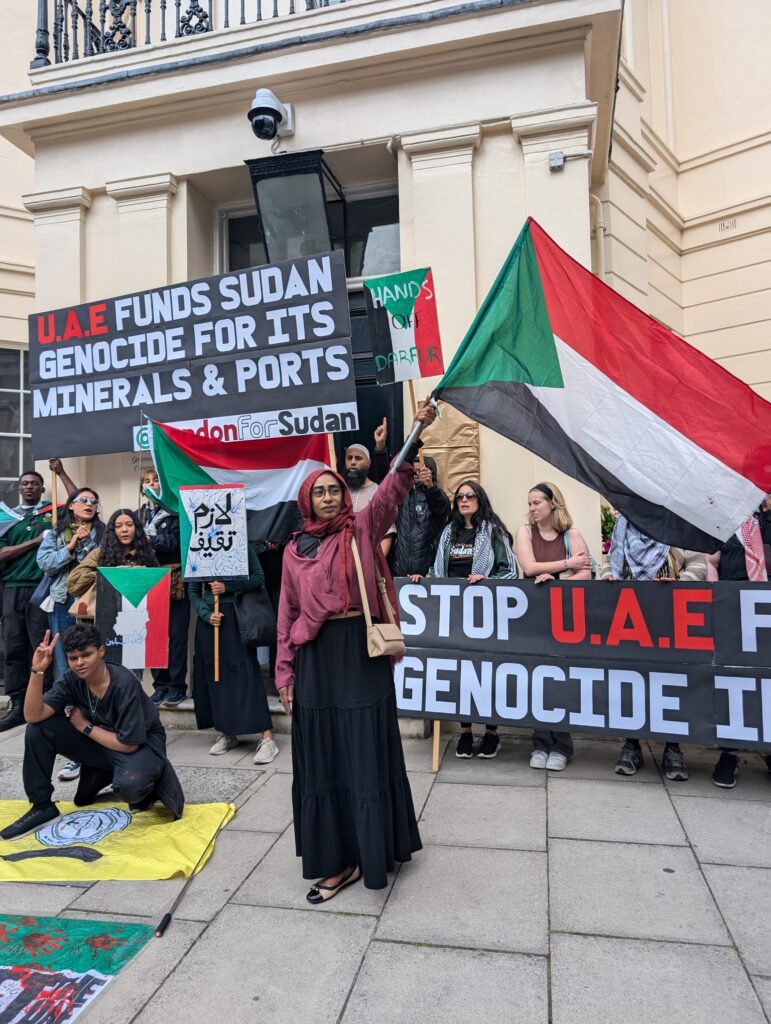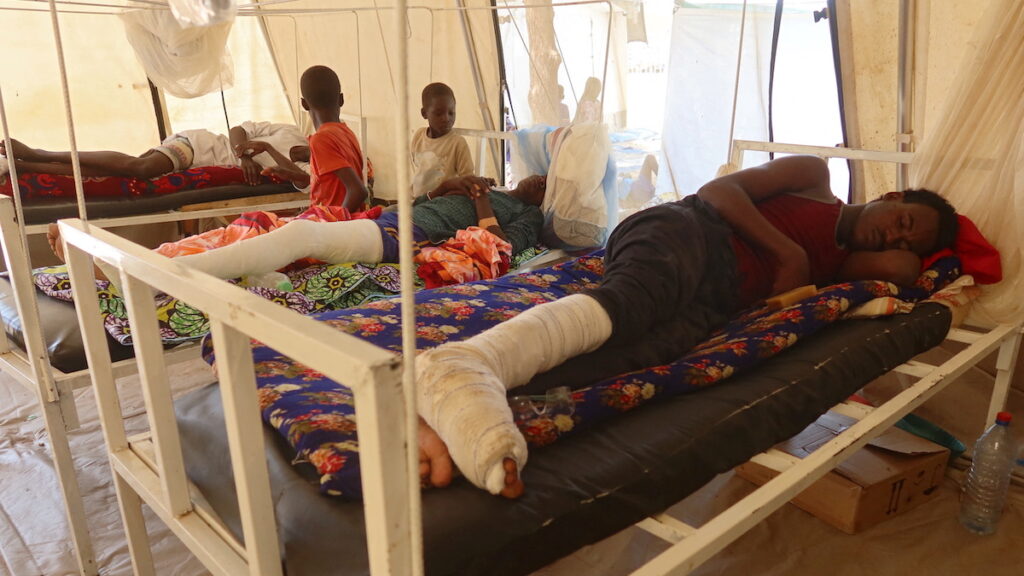The war that broke out in Sudan almost 16 months ago between the Sudanese army and the Rapid Support Forces has left a devastating impact, leaving some 10 million forcibly displaced and tens of thousands more dead. And while it denies any and all links, all reports indicate that the United Arab Emirates has been investing heavily in the violence, part of a strategic effort to expand its sway in the Horn of Africa.
Seeking to advance its own interests in the country, Abu Dhabi has funneled arms and money to the Rapid Support Forces paramilitary, facilitating large-scale atrocities and massacres. To pressure the UAE to end its sponsorship of this violence and its cooperation with war criminals, institutions linked with the UAE must start divesting.
Fueling a proxy war in Sudan
The RSF emerged primarily from restructuring the notorious Janjaweed militia in 2013, with the goal of supporting the central government’s counterinsurgency operations in Darfur and South Kordofan. In 2017, the Sudanese parliament passed a law legitimizing its activities. For years, the militia engaged in countless crimes and atrocities: destroying villages, killing protestors, sexual violations and rape, mass killings, killing based on ethnicity, unlawful detention, targeting hospitals and churches, attacking journalists and media institutions.
The cooperation between the UAE and RSF dates back to the beginning of the Yemen war. The deposed Sudanese president decided to deploy RSF and SAF fighters at the forefront. The UAE, which eventually found in RSF leader Mohamed Hamdan “Hamedti” Dagalo a trusted ally, later began to support the paramilitary group; it provided the RSF with money, hosted the RSF’s social media team, and arranged for the warlord’s diplomatic travels.
To pressure the UAE to end its sponsorship of this violence and its cooperation with war criminals, institutions linked with the UAE must start divesting.
The UAE has been providing military support to the militia, too. In just one week, open-source investigators identified three air shipments from the UAE to an airport it established east of Chad — a move in clear violation of the U.N. arms embargo on Sudan. A U.N. report mentioned that UAE flights coincided with a surge of highly sophisticated weaponry and arms used by the RSF, including drones and anti-aircraft missiles. Most recently, Yale’s Humanitarian Research Lab identified a UAE cargo plane suspected of providing lethal aid to the RSF militia in the region.
Update on July 25: The Guardian reports the “smoking gun” discovery of Emirati passports found in Sudan and linked to RSF soldiers, according to documents sent to the U.N. Security Council, which would prove that the U.A.E. is secretly putting boots on the ground in Sudan.
Last year, the New York Times found that injured RSF fighters were being airlifted to be treated in an Abu Dhabi military hospital. “Under the guise of saving refugees, the United Arab Emirates is running an elaborate covert operation to back one side in Sudan’s spiraling war,” the Times reported.

The UAE’s agenda in Sudan
The UAE believes that if the RSF militia takes power in Sudan, it can advance Abu Dhabi’s economic and political interests in the country. These include controlling more seaports and agricultural land, and preventing a return to power for Sudan’s Muslim Brotherhood-linked movement for hardline political Islam, the UAE’s traditional political foe that ruled Sudan for more than 30 years.
In addition, the UAE aims to recruit more Sudanese to fight in Libya alongside General Khalifa Haftar, the UAE’s main ally in Libya, who is coordinating with Russia’s infamous Wagner mercenary group. Various reports suggest that the UAE is co-financing Wagner in Libya, while Wagner supplies the RSF with arms in Sudan.
There are also direct economic incentives at play. A recent investigation by Swissaid found that the UAE is the top recipient of illegal gold smuggled out of the African continent, including Sudan, every year. Reports indicate close ties between RSF warlord Hamedti’s family and Sudan’s gold trade.
The genocide that the UAE is enabling
The result of the UAE’s ceaseless support of the RSF militia has been bloody. Several genocides and massacres have been committed by the militia, especially in the Darfur region. In November 2023, the RSF launched a six-day attack against the ethnic Masalit people in refugee camps in Ardamata. The U.N. reported that dozens were summarily executed, women were raped and thousands were forced to leave the city.

In a shocking example of its brutality against non-Arab tribes, the RSF militia committed another genocide in the West Darfur city of El Geneina, leaving thousands dead and hundreds of thousands displaced. A recent report by Human Rights Watch documented that RSF members also committed serious crimes such as rape, looting and torture there.
Despite international calls to prevent another genocide in the region, the RSF is now besieging El-Fashir, the last safe shelter for refugees in the region. The RSF has even attacked and obliterated refugee camps in Darfur, where many assumed it was a safe shelter for them.
Abu Dhabi’s impunity demands divestment
The UAE’s support of the RSF has been rebuked by many observers and rights groups. In April, Refugee International published a statement calling upon the UAE to abstain from supporting the militia and requesting the U.N. Security Council to intervene. U.S. Senator Sara Jacobs has introduced a resolution that would ban selling U.S. arms to the UAE until it stops aiding the RSF. Most recently, the U.S. Treasury Department blocked several UAE-based companies with links to the war in Sudan. And Congress is considering a resolution declaring the RSF’s acts against non-Arab tribes in Darfur as genocide.
In response to this global outcry, the UAE launched a disinformation campaign denying that it backs the RSF, rejecting credible and independent reports by falsely claiming it takes no side in the war. The UAE seems to have been working to impede any independent investigation into this issue: The U.K., an ally of the UAE who also holds the pen for Sudan in the U.N., has reportedly been attempting to suppress criticism of the UAE’s role in arming Sudan’s RSF militia. At Britain’s request, the U.N. Security Council also postponed a meeting to discuss Sudan’s complaint against the U.A.E.
Investors in Emirati projects should understand the ethical costs of backing a state that unabashedly funds a war militia and commits horrendous genocides for its own political and economic goals.
The ongoing genocides in Darfur represent one of the most violent crimes against humanity and a striking violation of human rights and international law. Given that the UAE did not respond to global condemnation, divestment is now the most powerful solution on the table to deter the UAE from continuing its support for the RSF militia and funding genocide.
The UAE has long been investing heavily in several institutions and initiatives around the world, not just to gain profit but to build soft power. That includes funding academic institutions at top American universities; the UAE has been partially funding the Middle East Initiative at Harvard Kennedy School, a unique program established in 1998 that provides a platform for emerging leaders and advocates to shape regional policy. The UAE has partnered with the Gates Foundation to work with local farmers to adapt to climate change issues. The UAE’s ruling family members have purchased several sports clubs in Europe, and the country has extended its tech sector, including Microsoft’s $ 1.5 billion investment in an Abu Dhabi-based AI development initiative. The UAE also has notable financial ties in the U.K. that include museums, water and energy companies, and top universities, from the Royal Philharmonic Concert Orchestra to The British Museum.
Investors and leaders of these projects should understand the ethical costs of backing a state that unabashedly funds a war militia and commits horrendous genocides to gain limited political and economic goals.
This divestment campaign must spread to popular arts and culture, too. Activists have recently been calling upon the U.S. rapper Macklemore, who has been outspoken in support of Gaza, to cancel his planned Dubai concert over the UAE’s role in backing the RSF. Another campaign calling upon tourists to stop visiting Dubai is now gaining many supporters. These moves represent the first step that should set an example for a large-scale divestment campaign.
By backing the RSF militia and its genocides, the UAE is reshaping the global peace order and sending a message to other malicious actors that they can take similar steps against others in the future knowing that their financial investments and shady political connections will guard them.
The world, which has witnessed several genocides in the Holocaust, Srebrenica, and Rwanda, should act boldly this time. We cannot keep standing on the sidelines, arms folded, and let the UAE fund another human tragedy in front of our eyes.

